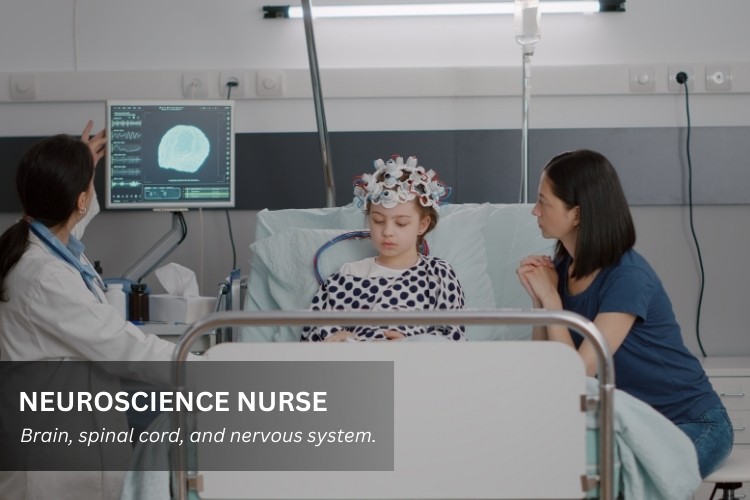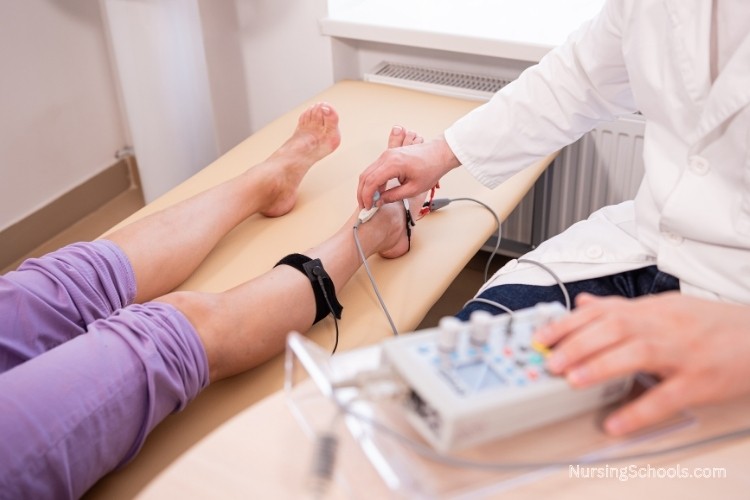Neuroscience Nurse (CNRN)
Nursing Career Guide

Overview
What Is a Neuroscience Nurse?
A Neuroscience Nurse is a Registered Nurse (RN) who specializes in caring for patients with neurological conditions, including brain and spinal cord injuries, epilepsy, stroke, Parkinson's disease, multiple sclerosis, and other disorders of the nervous system. These nurses play a vital role in monitoring neurological status, managing symptoms, and supporting recovery and rehabilitation.
Neuroscience Nurses work in hospitals, neuro-intensive care units, stroke centers, rehabilitation facilities, and outpatient neurology clinics. They may also assist with diagnostic procedures such as EEG and lumbar punctures, and often collaborate with neurosurgeons, neurologists, and rehabilitation therapists.
The Certified Neuroscience Registered Nurse (CNRN) credential, offered by the American Board of Neuroscience Nursing, validates expertise in this specialty and enhances professional credibility.
Education
How To Become a Neuroscience Nurse
Becoming a Neuroscience Nurse requires a combination of traditional nursing education, clinical work experience, certification, and specialized training in neurological or intensive care. Follow these steps to enter this challenging and rewarding healthcare career:
- Earn a Nursing Degree. Complete an Associate Degree in Nursing (ADN) or a Bachelor of Science in Nursing (BSN). A BSN is preferred for most hospital-based neuroscience roles.
- Pass the NCLEX-RN. Obtain licensure as a Registered Nurse by passing the National Council Licensure Examination.
- Gain Clinical Experience. Work in neurological or intensive care units to build foundational experience with patients who have brain or spinal cord conditions.
- Develop Specialty Skills. Learn neuro-assessment techniques, seizure precautions, rehabilitation planning, and neurological monitoring protocols.
- Optional Certification. Earn the Certified Neuroscience Registered Nurse (CNRN) credential to demonstrate advanced knowledge and commitment to the field.
How long does it take to become a Neuroscience Nurse? It typically takes 4 to 6 years to become a Neuroscience Nurse, depending on your degree path and clinical experience. CNRN certification requires at least two years of experience in neuroscience nursing and successful completion of the certification exam.

Average Salary
How Much Does a Neuroscience Nurse Make?
Neuroscience Nurse salaries vary depending on location, experience, and facility type. On average, a Neuroscience Nurse can expect to earn between $75,000 and $105,000 annually.
Average annual salary for a Neuroscience Nurse:
- Entry-level: $75,000 - $85,000 per year.
- Mid-career: $85,000 - $95,000 per year.
- Experienced: $95,000 - $105,000+ per year.
The U.S. Department of Labor classifies Neuroscience Nurses under Registered Nurses, who earn an average annual salary of $87,360. Those with CNRN certification or working in neurocritical care units may earn above-average wages due to the specialized skills required.
Career advancement for Neuroscience Nurses often involves pursuing supervisory roles such as Charge Nurse, Nurse Manager, or Clinical Nurse Specialist within a neurology or neurocritical care unit. Others contribute to the field through research, neuro-rehabilitation program development, or by taking on leadership roles in stroke centers or trauma programs.
Job Duties
What Does a Neuroscience Nurse Do?
Neuroscience Nurses care for patients with conditions affecting the brain, spinal cord, and peripheral nervous system. They provide both acute and rehabilitative care, while monitoring patients for changes in neurological status. The most common job duties of a Neuroscience Nurse include:
- Performing Neurological Assessments. Monitor and document changes in consciousness, pupil response, motor function, and cognitive ability.
- Managing Stroke and Head Injury Patients. Provide specialized care during acute events and rehabilitation, including medication administration and coordination of therapies.
- Assisting with Diagnostic Procedures. Prepare patients for MRI, EEG, and spinal taps while supporting physician-led evaluations and follow-up.
- Monitoring for Complications. Recognize and respond to complications such as seizures, increased intracranial pressure, or changes in mental status.
- Administering Medications. Deliver and monitor responses to neuro-related medications, such as anti-seizure drugs or corticosteroids.
- Educating Patients and Families. Provide guidance on managing chronic neurological conditions, medications, safety, and home care needs.
- Supporting Rehabilitation. Collaborate with physical and occupational therapists to develop recovery plans that support independence and mobility.
- Advanced Duties. Experienced Neuroscience Nurses may lead stroke response teams, mentor junior staff, or assist in neurosurgical procedures.
Neuroscience Nurses are essential in supporting patients with complex neurological needs. Their ability to recognize subtle changes in condition and respond quickly makes them critical members of interdisciplinary care teams.

Essential Skills
What Skills Does a Neuroscience Nurse Need?
Neuroscience Nurses must be detail-oriented, quick-thinking, and compassionate. They must understand both the physiology of the nervous system and how to respond to changes that may indicate a medical emergency. Here are some of the skills a Neuroscience Nurse needs to succeed:
- Neurological Assessment. Conduct precise evaluations of brain and spinal function to detect early signs of deterioration.
- Critical Thinking. Analyze complex symptoms and prioritize care in high-pressure situations, especially in neurocritical settings.
- Patient Education. Explain diagnoses, procedures, and care plans to patients and caregivers in clear, accessible language.
- Technical Skills. Operate specialized equipment such as intracranial pressure monitors or neuro-assessment tools.
- Team Collaboration. Work closely with neurologists, neurosurgeons, therapists, and case managers to coordinate care.
- Resilience. Support patients with life-altering conditions such as traumatic brain injury, stroke, or degenerative diseases.
- Infection Control. Follow strict protocols to protect vulnerable patients, especially after surgical or invasive procedures.
- Leadership. Take charge in emergency situations, contribute to stroke alert teams, and help develop neuro-unit protocols.
One of the biggest challenges of being a Neuroscience Nurse is the complexity of patient conditions and the need for continuous assessment. Even small changes in pupil size, motor response, or level of consciousness can signal life-threatening complications that require immediate action. Nurses must remain highly alert and skilled in identifying subtle neurological shifts to prevent permanent damage or deterioration.
Work Environment
Where Does a Neuroscience Nurse Work?
Neuroscience Nurses work in healthcare environments that specialize in the diagnosis, treatment, and rehabilitation of patients with neurological conditions. These nurses care for individuals affected by brain injuries, stroke, epilepsy, spinal cord injuries, and neurodegenerative diseases. The most common workplaces for a Neuroscience Nurse include:
- Neurology Units in Hospitals. Provide care for patients undergoing treatment for conditions such as Parkinson's disease, multiple sclerosis, or meningitis.
- Neurosurgical Units. Assist in post-operative care for patients recovering from brain or spinal surgery, often requiring close neurological monitoring.
- Intensive Care Units (ICU). Manage critically ill patients with traumatic brain injuries, strokes, or seizures who require advanced support and monitoring.
- Rehabilitation Centers. Help patients regain function and independence following neurological events or surgeries.
- Outpatient Neurology Clinics. Support long-term management of chronic neurological conditions through patient education, medication coordination, and follow-up assessments.
- Academic or Research Institutions. Participate in clinical trials or conduct research related to neurological nursing practices and patient outcomes.
Neuroscience Nurses often work in fast-paced, high-acuity environments that demand precise observation and rapid decision-making. Shifts may include nights, weekends, or holidays, especially in hospital-based roles. Their work is both mentally and emotionally demanding, yet highly impactful for patients facing complex neurological challenges.
Last updated: May 22, 2025
References:
- Registered Nurses. Bureau of Labor Statistics, U.S. Department of Labor. Occupational Outlook Handbook. Retrieved May 22, 2025.
- NCLEX Nurse Licensure Exam. National Council of State Boards of Nursing (NCSBN). Retrieved May 22, 2025.
- Registered Nurse (RN) Salary in the United States. ZipRecruiter, Healthcare Career Path. Retrieved May 22, 2025.
- How To Become a Registered Nurse. Indeed, Healthcare Career Guide. Retrieved May 22, 2025.
- Neuroscience Nurse. Johnson & Johnson, Nursing Careers. Retrieved May 22, 2025.
- Certified Neuroscience Registered Nurse (CNRN). American Board of Neuroscience Nursing (ABNN). Retrieved May 22, 2025.
- Community of Neuroscience Leaders. American Association of Neuroscience Nurses (AANN). Retrieved May 22, 2025.
- Neuroscience Education. World Federation of Neuroscience Nurses (WFNN). Retrieved May 22, 2025.
- nurses caring for children with neurological conditions. Association of Child Neurology Nurses (ACNN). Retrieved May 22, 2025.
- What is a neuroscience nurse. Herzing University, Types of Nurses. Retrieved May 22, 2025.
- Bachelor of Arts in Neuroscience. University of Colorado Boulder, Academic Programs. Retrieved May 22, 2025.


